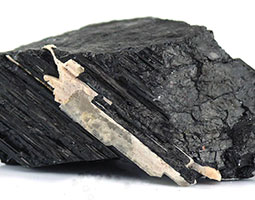Description

Schorl is best known as 'Black Tourmaline' and is the most ccommon form of Tourmaline. Although other forms of Tourmaline may be black, Schorl is exclusively black and, unlike other Tourmaline forms, is never transparent or even translucent. It may be highly lustrous and form in crystals, and is one of the most aesthetic black minerals known. Schorl derives its name from the old mining term for black tourmaline found in a tin mine in a German village near the Western Ore Mountains, called Zschorlau. When Dutch travellers to the Indies brought back the first tourmaline stones to Europe in 1703, they brought the original name ‘turamali’, from the Singhalese (Sri Lanka). The Dutch knew the extraordinary property of tourmaline, its tendency to become electrically charged when rubbed or heated. Later Benjamin Franklin, researcher, writer and statesman, did extensive research on the properties of tourmaline in the process of forming his theories and inventions using electricity.
Source